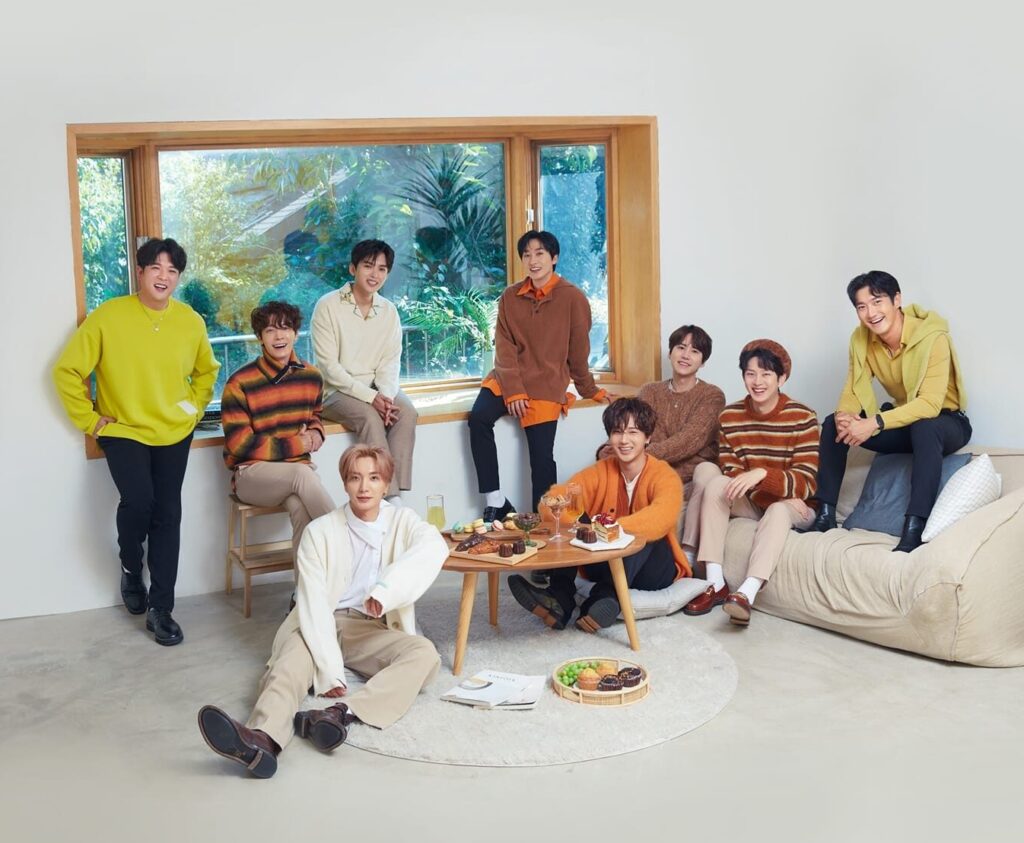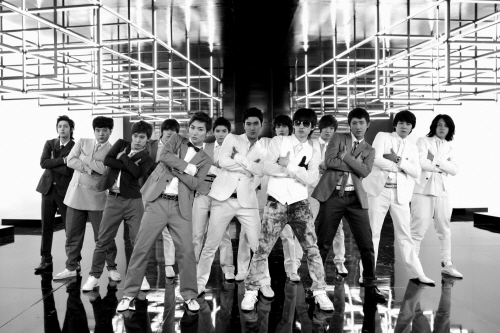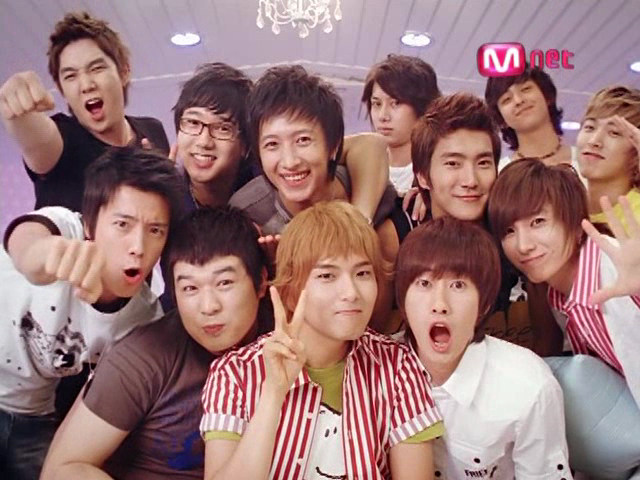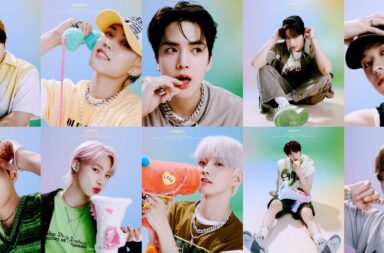
For long-time K-pop fans that have, by some miracle, avoided feeling old while mingling online with the legions of teenage fans that have just been introduced to the genre, let this fact now sink in: veteran SM Entertainment boy group Super Junior have now been active for longer than many of those fans have been alive. The once thirteen-, now nine-membered, group first debuted on 6th November 2005 with “Twins (Knockout Song)”, when oldest member Leeteuk was just 22 years old. To put things in perspective, it was the same year that YouTube was founded, and the exact same day that Harry Potter and the Goblet of Fire was first shown in cinemas.
Fast-forward 15 years and you arrive in 2020, where Super Junior are about to release their tenth studio album and leader Leeteuk is now 37. They’re probably now best known for their jovial characters and witty humour, a talent that has earned multiple members extremely coveted long-term variety gigs. Seeing them crack jokes at every opportunity while bickering and teasing each other like children and generally being their jolly selves, it would be easy to think that they must have had it easy these 15 years. But every group goes through ups and downs, and Super Junior have experienced so many of the latter that it’s truly a wonder that they’re still together.
In 2006, Heechul suffered a leg injury in a car accident that permanently affected his ability to participate in dance performances. In 2007, four members were involved in another serious car accident; it almost ended Kyuhyun’s career, leaving him in a coma for four days and hospitalised for four months. Later, new members, Henry and Zhou Mi, debuted in the Chinese subunit, Super Junior M, but fans vehemently opposed their addition to the group and vicious backlash prevented them from ever joining Super Junior officially.

After “Sorry Sorry” exploded in popularity in 2009, Chinese member Hangeng departed suddenly from the group leaving only a lawsuit, while Kibum temporarily left the group to focus on acting, never to return. Meanwhile, Kangin was involved in the first of several incidents of DUI that would eventually lead to his voluntary withdrawal from the group in 2019. In 2014, Sungmin announced his marriage soon before enlisting in the military, but fans took offence at the manner of his announcement, demanding that he leave the group and orchestrating a boycott that has forced him to halt activities with the group ever since.
For those who are young or unfamiliar with the group, this may just seem like a long Wikipedia list of disconnected names and events. But all of the members of Super Junior –- past, present, official and unofficial -– will know just how long and dark some of those days were, and how slowly yet quickly these years have passed.
The fact that they are still standing together after all of this, long after many of their contemporaries have disbanded, is a credit to their admirable resilience as individuals and incredible solidarity as a group. They may no longer be putting out songs capable of achieving the popularity of their peak, nor be able to keep up with the powerful, synchronised dances of their bright-eyed juniors, but their resilience and tenacity, their will to strive, thrive, and survive both as entertainers and as people, is almost unmatched.

Despite the trials and tribulations that they have been through, all of them work hard to make sure their TV personas are associated only with fun and laughter, and this comes across in their music as well. On their title tracks, they tend to opt for easily accessible, upbeat dance-pop numbers that complement their fun-loving personalities, often featuring brass instruments (such as on “Mamacita”) or buzzing noughties synths (such as on “Sorry Sorry”), and sometimes both (“Black Suit” and “Super Clap”).
Only rarely do they reveal their more mature sides, such as on the gorgeous and vulnerable “Evanesce” and sultry “This Is Love” from 2014’s Mamacita. Perhaps because this style is truer to their age (in the best way possible), songs like these carry more depth, and while both styles suit the group well, the latter remains vastly underexplored and thus underrated.
As such, the few B-sides that do venture into this territory end up being the most memorable from their very prolific discography, at least from the last eight years or so. We previously covered their B-sides in 2012, and they’ve since released four studio albums and a compilation album, plus repackages for each (and that’s excluding releases from subunits like Super Junior K.R.Y. and Super Junior D&E). They may have fulfilled their potential as comedians and TV personalities, but within these releases are several hidden gems that demonstrate what Super Junior are capable of as artists and musicians, given the chance and enough good direction.
The first is “Midnight Blues”, a B-side from Mamacita. With a dreamy, sensual atmosphere created by dramatic bass hits, soft electric piano chords, and breathy, multi-layered vocals, it shows us Super Junior at their most smooth and sophisticated. Members normally limited to rap verses are given a chance to shine on vocal lines suited to their range; Shindong’s vocal adlib on the second verse is a pleasant surprise and real highlight. Complementing the music and performance are stunningly poetic lyrics that describe a love that is as intoxicating as wine:
You and I, I thought I wouldn’t last a day without you
I fill you up in my empty glass and I open my half-closed, blurry eyes
Who am I? I clutched my aching heart and tried to turn away for days
Drinking in the cold night air, wandering in this place without you
Again
From the repackaged version of the same album, This Is Love, comes “Hit Me Up”, which uses their favoured brass sound to create a more sinister atmosphere. After a dramatic brass intro, acoustic drums kick in, but the instrumental remains fairly minimalistic throughout, peppering open spaces with subtle backing vocals instead. It’s a rare example of Super Junior exploring a sound that is both darker and more mature, without sacrificing their signature mischievousness.
While Super Junior’s presence in the variety circuit is largely spearheaded by rappers like Heechul, Shindong, and Eunhyuk, the quality of their music is carried by their vocal line, also known as the subunit Super Junior K.R.Y.: Kyuhyun, Ryeowook and Yesung (although Kyuhyun has been very successful in variety as well). All three have beautiful vocal tones that are not only distinctive but incredibly versatile, shining through on every song regardless of genre. Ryeowook’s higher tone and stylish delivery flood songs with light, while Yesung’s husky voice creates instant texture, often in contrast to Ryeowook’s smoother sound. Meanwhile, Kyuhyun’s velvety timbre adds class to even the most basic and low-brow of songs, bringing elegance to Super Junior’s vocals that few other groups are able to replicate.
All three are put to use on “Simply Beautiful”, a B-side from 2015’s Devil that features the vocal line plus Kangin and Siwon. Soulful vocals are layered into complex, jazzy chords on the deceptively simple chorus, which is followed by a catchy call-and-response hook that cements the song as one of the most memorable highlights from the compilation album. The contrast between Ryeowook and Yesung’s vocals on the first pre-chorus is especially lovely; Ryeowook lays down vocals as clear and delicate as glass before Yesung follows up with vocals so husky that they are like a fur rug laid on top.
Finally, we have “You Got It” from Magic, the repackage of Devil, which is performed by Eunhyuk, Heechul, Leeteuk, Donghae, and Yesung. Over a jazzy guitar and soft RnB beat, Eunhyuk, Heechul, and Leeteuk take turns to rap self-written verses responding to the criticisms that people often throw at them, while Donghae and Yesung interject with vocals so sweet that the song sounds like it should be about love instead. Heechul’s verse is particularly interesting, with sharp words and clever references that go beyond what is expected of him as an idol rapper:
Oh my beautiful eyes
1 Wordplay: “soo man lee” also means tens of thousands of “ri”s, which is a measurement of distance (1 ri = 0.4 km)
Admit it, they’re like doll eyes
I don’t take sides, everyone is so busy hating
I came a long way with someone I respect, Soo Man Lee1
He told me that I have vision
It may seem like a surplus but it’s just blocked talk
There’s no way I’ll run out of work
I enjoy my life, it’s like a blossomed flower
I am my own god of the heavens and earth
That saying fits with me like raisins and mocha bread
It’s fine as long as I don’t hurt others
I’m showing off because I really am well off
They say I live recklessly
Seriously? I’m not a chaebol, what did I buy?
They’re all criticizing my life, telling me what to do
But no thanks, whether I’m struggling or happy
I refuse
Like my pretty juniors
Intelligently and calmly2
Like Blo-hyung
I’m looking for a happy day3
2 Seulgi (Red Velvet) means “intelligent” and Taeyeon (Girls Generation) means “calm”
3 Tablo’s daughter Haru’s name means “day”
Fans profess eternal loyalty all the time, but with the short lifespan of most groups and the speed at which trends and technology change, realistically it’s difficult to predict what any group might really be like five, ten, or fifteen years after debut. Super Junior are one of the only examples of a modern K-pop group, one which represents the genre’s current format, warts and all, that has lived long enough to show us what it can look like.
Fifteen years is a long time after all, by not just K-pop but any standards, and as we and the group now well know, anything can happen at any time. So, if in fifteen years your favourite group are doing what Super Junior are doing now, celebrating their anniversary while working on a tenth album and with more than half of their members present, then know that they will be doing very, very well indeed.
(YouTube [1]. Lyrics via Pop!Gasa. Images via SM Entertainment.)


